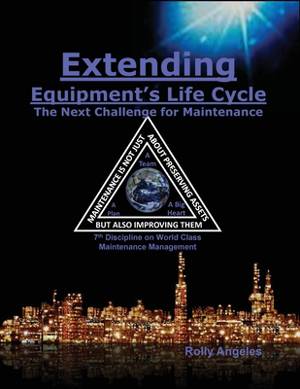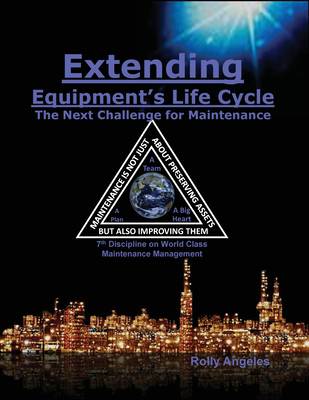
- Retrait gratuit dans votre magasin Club
- 7.000.000 titres dans notre catalogue
- Payer en toute sécurité
- Toujours un magasin près de chez vous
- Retrait gratuit dans votre magasin Club
- 7.000.0000 titres dans notre catalogue
- Payer en toute sécurité
- Toujours un magasin près de chez vous
Extending Equipment's Life Cycle - The Next Challenge for Maintenance
7th Discipline on World Class Maintenance Management
Rolly AngelesDescription
The objective of any maintenance program in industries is to take care of the Equipment's Total Life Cycle at the most reasonable cost with compliance to quality, safety, and the environment. To perform this we need the following;
- Upgrade the skills and knowledge of our maintenance people
- Sustain equipment reliability by doing the correct maintenance
- Improve design weaknesses in the equipment
- Reduced the cost of doing maintenance
This means that before we can even sustain and preserve our equipment and assets, we need to provide our maintenance people with the knowledge to develop their skills to do their job correctly, but it does not stop from here. Sustaining and preserving the equipment is merely the beginning. Maintenance must also understand their equipment, especially on those parts, spares, and items with inherent design weaknesses, and improve them. Doing this will definitely reduce the cost of doing maintenance.
This book is written based on the Author's personal experience on how to make it possible to extend the Total Life Cycle of the equipment so that we can operate and maintain them at the least amount to own the asset. The study of the life cycle is simply the sum of both the Initial and the Running Cost of the equipment. While the initial cost is easy to see as it is always given, the running cost is not but it can still be projected. This book also explains how to integrate the pillar of TPM IFCA or Initial Flow Control Activities to shorten the vertical start-up time of the equipment. Some of the highlights of this book include the following;
- Why Life Cycle Costing is Important for Industries
- No Equipment is Perfect by Design
- Why Equipment Can No Longer be Used?
- The Six Conditions for Equipment's Initial Flow Control Activities
- Why Cheap Is Expensive
- Why Do Equipment fail and What Can be Done About It?
- Human Errors Explained
- When Maintenance Errors Cost Lives
- Maintenance and Non-Maintenance Errors
- Reducing Human Errors in Maintenance
- Strategies to Reduce Equipment's Maintenance Costs
- A Deeper Meaning of Reliability
- Why Reliability is Everybody's Responsibility
- Difference Between the East and the West Approach to Improvements
- Industries Problems Can Go Beyond Equipment Losses
- Detailed Steps in Monitoring Equipment Life Cycle
- Cost Cutting the Wrong Way to Save on Maintenance Costs
- The Challenge with Maintenance
- And More . . .
Spécifications
Parties prenantes
- Auteur(s) :
- Editeur:
Contenu
- Nombre de pages :
- 340
- Langue:
- Anglais
- Collection :
- Tome:
- n° 12
Caractéristiques
- EAN:
- 9798885260077
- Date de parution :
- 31-07-22
- Format:
- Livre broché
- Format numérique:
- Trade paperback (VS)
- Dimensions :
- 216 mm x 279 mm
- Poids :
- 789 g

Les avis
Nous publions uniquement les avis qui respectent les conditions requises. Consultez nos conditions pour les avis.






